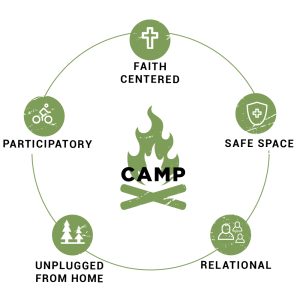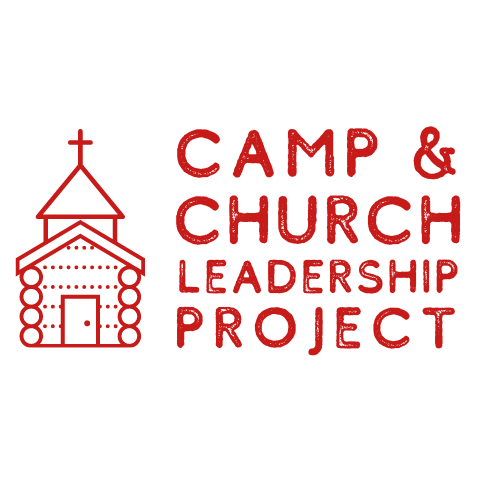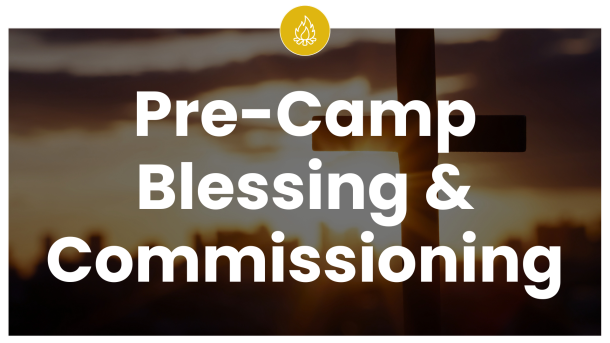 This might be the most recognizable characteristic of camp. Think of the most iconic mental pictures of camping: a tent, a campfire, a grove of trees, a body of water. The philosophy of summer camp, from its beginnings in the late 19th century, has centered on removing young people from their normal routines and ways of life by plunging them into more primitive, preferably unfamiliar, environments.
This might be the most recognizable characteristic of camp. Think of the most iconic mental pictures of camping: a tent, a campfire, a grove of trees, a body of water. The philosophy of summer camp, from its beginnings in the late 19th century, has centered on removing young people from their normal routines and ways of life by plunging them into more primitive, preferably unfamiliar, environments.
Unplugging from home means at least two things.
First, camps are away from home. We are unplugging young people from their normal environments. This can be difficult for the increasing percentage of young people who have never spent a night away from their parents. It is also incredibly important for psychosocial development. They face new experiences and are challenged in new ways, and they discover an important truth: I can do this. They can survive and even thrive away from their parents and their everyday comforts. This builds independence and another incredibly important attribute: grit. They may get homesick. That is okay and natural. We can look at homesickness as a positive sign that campers are missing their healthy home environment. But we also know that not all campers come from loving, stable home environments, so time at camp can also be a reprieve from a variety of challenges and even a place to seek help. Being away from home also provides space for young people to explore their identities in a new, supportive environment. They no longer need to be the slow one or the smart one or the younger brother or the troublemaker or whatever other identity (positive or negative) that others have placed upon them. Remember, this identity formation is not simply done in a vacuum. It takes place in the context of a safe, faith-centered place where they are supported through strong relationships.
 Second, camps provide time and space to be unplugged from technology. Young people are growing up in a world where they are constantly plugged in and online. Camp is one of the only spaces where they are unplugged for days at a time. They need this reprieve. They need spaces where they look one another in the eyes and have in-person conversations. They need to know what comfort and empathy look like when they are not conveyed through emojis but rather through physical presence and touch. You can find hundreds of articles where adults speak of the benefits of unplugging from technology (psychology, neurology, sociology: all the -ologies!). But I get to talk with young people all over the country about experiencing the absence of technology at camp. In focus group after focus group, the sentiment is clear: campers recognize the benefits of being unplugged from technology, and they almost always conclude that they are happier without it. They report feeling more relaxed, more connected to one another, and better able to be present in the moment.
Second, camps provide time and space to be unplugged from technology. Young people are growing up in a world where they are constantly plugged in and online. Camp is one of the only spaces where they are unplugged for days at a time. They need this reprieve. They need spaces where they look one another in the eyes and have in-person conversations. They need to know what comfort and empathy look like when they are not conveyed through emojis but rather through physical presence and touch. You can find hundreds of articles where adults speak of the benefits of unplugging from technology (psychology, neurology, sociology: all the -ologies!). But I get to talk with young people all over the country about experiencing the absence of technology at camp. In focus group after focus group, the sentiment is clear: campers recognize the benefits of being unplugged from technology, and they almost always conclude that they are happier without it. They report feeling more relaxed, more connected to one another, and better able to be present in the moment.
We must not take this characteristic for granted. More and more camps are building beautiful indoor facilities with every creature comfort imaginable (including WiFi). Now, I am not a purest when it comes to camping ministry. I have been to Texas camps in July, and I see the need for air-conditioned cabins! I admit that I wish every camper could have the opportunity to go on trail for a week in the mountains or the Boundary Waters Canoe Area. But I also know that you do not need pristine wilderness to provide campers the experience of being unplugged from home. The key is to get them out of their normal environments into new spaces. Use the outdoor spaces that you have available to you. Let the campers cook over the fire. No, I don’t care how much the dining hall cost. Let the campers burn the toast and gush over how amazing it tastes when they are the ones who burnt it. Have your activities outside as much as possible, using natural light and campfire light. Let the campers experience being scared of the dark. Let them stare in awe at a starry sky. Let them walk someplace in the rain. Let them hear the noises of the natural world.
Remember that camp has this incredible gift to give. It may be the only place left that these young people have the chance to be unplugged.
This post is part of a series on the five fundamentals of Christian summer camp. Read about other characteristics here: SAFE SPACE, FAITH CENTERED, PARTICIPATORY, RELATIONAL










Hi Jake, John from Ross Point Baptist Camp. Will you add me to your blog list? I am looking forward to Part 4 and 5.